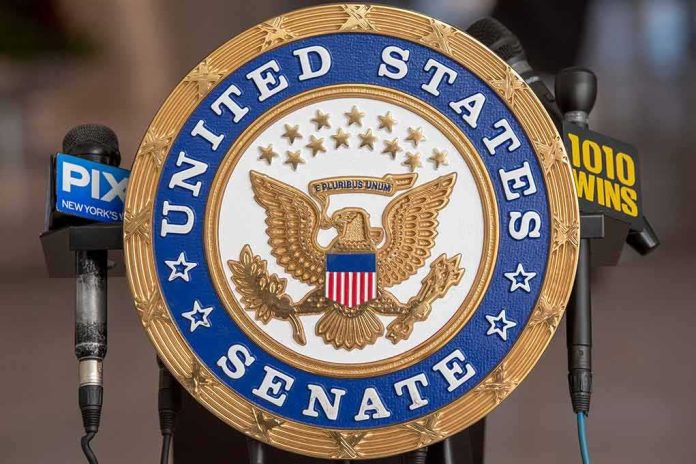
Amid a deepening government shutdown, a Senate bill to ensure pay for military and federal workers becomes a flashpoint of partisan conflict, leaving livelihoods hanging in the balance.
Story Snapshot
- Senate Democrats block GOP’s Shutdown Fairness Act aimed at paying military and federal workers.
- Democrats argue the bill would allow Trump administration undue discretion in worker payments.
- Shutdown continues with military and federal workers facing missed paychecks.
- The bill’s failure underscores political polarization over managing government shutdowns.
Senate Clash Over Shutdown Fairness Act
The U.S. Senate recently witnessed a dramatic vote on the Shutdown Fairness Act, a Republican-sponsored bill intended to ensure that active-duty military and essential federal workers receive their paychecks amid an ongoing government shutdown. The bill, introduced by Sen. Ron Johnson (R-Wis.), fell short of the necessary 60 votes to advance, garnering only 54 in favor. The failure to pass this legislation highlights the persistent and deep partisan divide that characterizes current U.S. politics.
Senate Democrats, who largely opposed the bill, argued that it conferred excessive discretion to the Trump administration over which federal employees would be compensated. They contended that this could politicize the process, allowing the administration to favor certain workers over others, based on political considerations. This concern about undue influence and potential misuse of power was pivotal in their decision to block the bill, despite the urgent financial needs of military personnel and federal employees during the shutdown.
Political Standoff and Its Implications
The ongoing government shutdown, which began on October 1, 2025, has now surpassed three weeks, leaving many military families and federal workers facing uncertainty and financial hardship. Senate Republicans have accused Democrats of obstructing necessary support for these essential workers. Sen. Kevin Cramer (R-N.D.) publicly criticized Democrats for what he termed “absurd obstruction,” suggesting that their actions were politically motivated and detrimental to those serving the country.
Conversely, Democrats argue that the GOP-sponsored bill is a strategic maneuver by the Trump administration to extend its leverage during budget negotiations. They claim that by selectively paying certain federal employees, the administration could prolong the shutdown to further its broader policy goals, including contentious issues like healthcare and federal spending cuts.
Historical Context and Current Developments
Government shutdowns in the U.S. are not a new phenomenon and occur when Congress fails to pass appropriations bills or continuing resolutions to fund federal agencies. Historically, both parties have proposed targeted funding bills to address the issue of paying military and essential federal workers during such shutdowns. However, these attempts often fail due to disagreements over the scope of the bills and concerns about executive discretion.
Recently, the Senate saw three Democrats—Jon Ossoff, Raphael Warnock, and John Fetterman—break ranks to support the GOP bill, highlighting the internal pressures and differing perspectives within the Democratic Party. Meanwhile, Republicans blocked a Democratic alternative bill that would have limited the administration’s ability to lay off federal workers, further illustrating the gridlock that has become characteristic of this shutdown.
Impact and Future Outlook
The immediate impact of the Senate’s failure to pass the Shutdown Fairness Act is the continued financial strain on military personnel and essential federal workers. Without paychecks, these individuals face significant economic hardships, which could affect morale and operational readiness. The long-term implications include potential challenges in recruitment and retention within the military and federal workforce, as repeated shutdowns and the politicization of worker pay erode trust and stability in government service.
https://twitter.com/angie_jaram/status/1981729720812150829
As the shutdown drags on, the political landscape remains highly polarized, with each party seeking to frame the narrative in their favor. The ongoing stalemate suggests that without a compromise that addresses both parties’ concerns, the situation may continue to deteriorate, with broader implications for national security and public safety. The Trump administration’s consideration of using alternative funds to pay troops if Congress fails to act further complicates the negotiations and underscores the urgency of finding a resolution.













